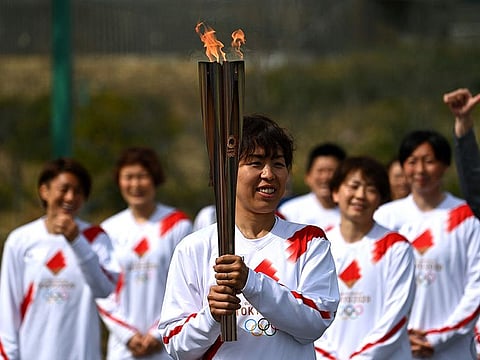Tokyo Olympics: Torch relay starts in Fukushima to signal hope after despair
The small flame was waiting for this day, says organising committee chief Hashimoto

Also In This Package
The statement Japan made by starting their Olympics torch relay for the Tokyo Games in Fukushima - an area hit hard by the 2011 earthquake, tsunami and nuclear disaster - could not be missed on Thursday.
With organisers billing the Games as the ‘Recovery Olympics,’ a nod to the disaster as well as the pandemic, the relay began its four-month journey on a low key even as Tokyo 2020 president Seiko Hashimoto struck an optimistic note to overcome the crisis and stage the Games. “For the past year, as the entire world underwent a difficult period, the Olympic flame was kept alive quietly but powerfully,” Hashimoto said at the opening ceremony, which was closed to spectators.
“The small flame did not lose hope, and just like the cherry blossom buds that are ready to bloom, it was waiting for this day,” the former Olympian said.
Casting a pall over celebrations already scaled back because of coronavirus prevention measures, North Korea launched two short-range ballistic missiles before the relay began in Fukushima.
The relay runners included many who had fled after the meltdowns at the Fukushima Daiichi power plant, according to a Reuters report.
“This town is where I was born and raised, and I never thought a torch relay would be held here,” said Takumi Ito, 31, speaking in Futaba, one of the towns worst hit by the nuclear disaster.
“We are still in the coronavirus pandemic, but I think it’s great we could hold the relay.”
Japan has fared better than most countries, with about 9,000 coronavirus deaths, but Tokyo reported 420 cases on Wednesday, the highest single-day figure this month. Polls showed the majority of the public is against holding the Olympics as scheduled.
About 10,000 runners will take part in the four-month relay, which will go through all of Japan’s 47 prefectures. The relay, which will culminate with the Olympic opening ceremony on July 23, has been hit by several high-profile runner cancellations as celebrities and top-level athletes have pulled out, citing late notice and worries over the pandemic.
The brief, solemn ceremony was held at J-Village in Fukushima, a sports complex converted for several years into a staging ground for workers decommissioning the crippled nuclear power plant.
“For the torch relay viewing, please ensure you are wearing a mask, keep proper distance, don’t stand close to each other and support with things like clapping, instead of using a loud voice,” an announcer said.
Low-key events featuring Fukushima residents in drum and dance performances were followed by a children’s choir before the Olympic flame, flown in from Greece last year and kept alight under 24-hour guard, was used to ignite the torch.
Members of the Japanese national women’s soccer team were the first group to run with the flame, wearing white uniforms decorated with red.
The organisers insist the Olympics will go ahead, but doctors and nurses have complained about the strain on hospitals and experts warn about the spread of virus variants.
Japan was the last of the Group of Seven industrialised nations to launch a vaccine drive. Only 700,000 people have been inoculated so far, most of them medical workers.
Sign up for the Daily Briefing
Get the latest news and updates straight to your inbox








